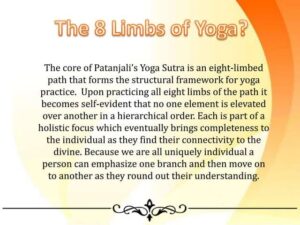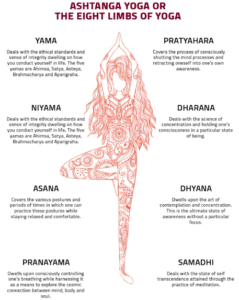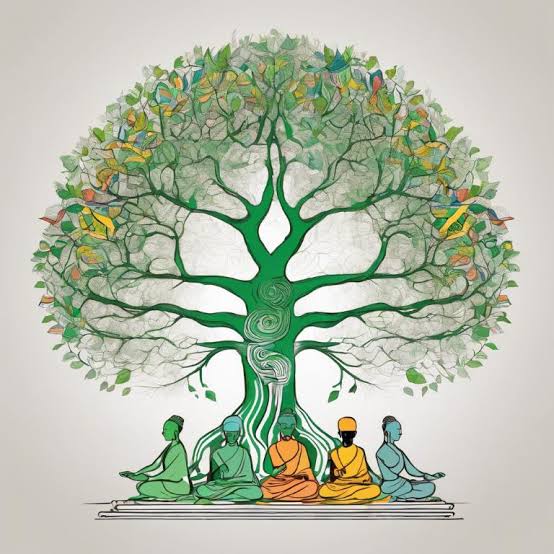Meanings of sutras 26 to 30 from Patanjali’s Yog Sutras:

MOST IMPORTANT TEACHING COMES IN FOLLOWING SUTRAS
26. Sutra: “Viveka khyatihi aviplava hanopayah.”
Meaning: “The unbroken awareness of discrimination is the means to overcome obstacles.”
Sutra 26 reminds us that having a continuous awareness of discrimination helps us overcome obstacles in our spiritual journey. It means being able to discern between what is beneficial and what is not, allowing us to make wise choices.
27. Sutra: “Tasya saptadhaa pranta-bhumih prajna.”
Meaning: “From that arises wisdom, which is sevenfold in its progressive stages.”
Sutra 27 tells us that as we cultivate this discrimination, wisdom unfolds in seven progressive stages. Each stage brings us closer to a deeper understanding of ourselves and the world around us.
ASHTANGYOGA / RAJYOGA / 8 LIMBS OF YOGA

28. Sutra: “Yoganganusthanad asuddhi-ksaye jnanadiptih aviveka-khyateh.”
Meaning: “By the practice of the limbs of yoga, impurities are destroyed, and knowledge is illuminated, leading to the discernment of truth.”
Sutra 28 emphasizes that through the practice of the eight limbs of yoga, we can purify ourselves and gain illuminating knowledge. This knowledge helps us see the truth and make clear decisions in our lives.
29. Sutra: “Yama-niyama-asana-pranayama-
Meaning: “The eight limbs of yoga are: ethical principles, observances, posture, breath control, withdrawal of the senses, concentration, meditation, and absorption.”
This sutra tells us lists the eight limbs of yoga, which are the foundational practices for spiritual growth. These limbs include ethical principles, physical postures, breath control, withdrawal of the senses, concentration, meditation, and absorption. Each limb contributes to our overall well-being and spiritual development.


30. Sutra: “Ahimsa-satya-asteya-
Meaning: “The ethical principles (yamas) consist of non-violence, truthfulness, non-stealing, celibacy, and non-possessiveness.”
this sutra tells us focuses on the ethical principles, known as yamas. These principles include non-violence, truthfulness, non-stealing, celibacy, and non-possessiveness. By embodying these principles, we create a harmonious and virtuous way of living.
AYURVEDA also says the importance of yoga
Ayurveda is an ancient Indian system of medicine that focuses on achieving balance and harmony in the body, mind, and spirit. It emphasizes the importance of individualized treatments and lifestyle practices to promote overall well-being. In Ayurveda, there are various practices that can be incorporated into daily life, such as yoga, meditation, and self-care rituals.
Yoga is a fundamental part of Ayurveda and is often practiced to promote physical strength, flexibility, and mental clarity. It involves different postures (asanas), breathing exercises (pranayama), and meditation techniques. These practices help in calming the mind, reducing stress, and improving overall health.
Meditation is another key practice in Ayurveda. It allows us to quiet the mind, cultivate mindfulness, and connect with our inner selves. It can be done in various ways, such as focusing on the breath, repeating a mantra, or observing thoughts without judgment.
Self-care rituals in Ayurveda involve taking care of oneself holistically. This includes nourishing the body through a balanced diet, practicing good hygiene, getting enough restful sleep, and engaging in activities that bring joy and relaxation.
In Ayurveda, there is also a focus on letting go of attachments and finding inner peace. This involves cultivating awareness of our attachments and desires, and learning to detach from them in order to experience a sense of freedom and contentment.
